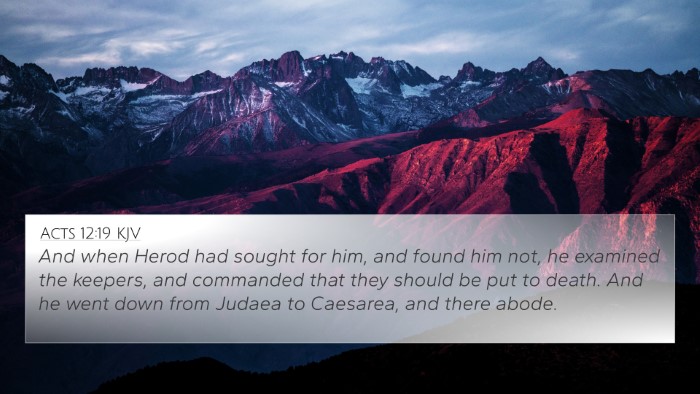Understanding Matthew 28:14
Verse: "And if this come to the governor's ears, we will persuade him, and secure you." (Matthew 28:14)
This passage, spoken by the chief priests and elders, revolves around the events following the resurrection of Jesus Christ. It highlights the conspiratorial efforts to maintain the narrative that the body of Christ had been stolen by His disciples.
Commentary Insights
Matthew Henry's Commentary
Matthew Henry emphasizes the deceitfulness of the religious leaders who attempted to fabricate a cover-up story to discredit the resurrection. He notes that their intentions were not only to protect their power but also to prevent the truth of the resurrection from spreading among the people. This indicates a fear of the growing influence of Christ’s message.
Albert Barnes' Notes
Albert Barnes further explores the implications of this verse, highlighting the lengths to which the Jewish leaders would go to deny the miraculous event of Christ's resurrection. He describes the urgency in their actions, signifying their desire to maintain control over the narrative about Jesus. Barnes suggests that this illustrates the conflict between truth and falsehood that characterizes the Gospel story.
Adam Clarke's Commentary
Adam Clarke provides insight into the nature of the response from the authorities, pointing out their willingness to rely on human means rather than divine truth. Clarke interprets their proposal to the governor as a representation of worldly tactics against divine revelation, showcasing a broader spiritual tension. He highlights the futility of their efforts against the reality of the resurrection.
Thematic Bible Verse Connections
This verse can be linked to several key themes in the Bible, including:
- Deception: Matthew 28:13 also discusses how the guards were instructed to say the disciples stole Jesus' body.
- Fear of Authority: In John 12:42-43, many among the rulers believed in Jesus but feared to confess Him due to the Pharisees.
- Resistance to Truth: Luke 16:14 details how the Pharisees derided Jesus, evidencing their desire to suppress his influence.
- Covering up the Truth: Acts 5:28-29 closely reflects the conflict with the authorities after the resurrection.
- Spiritual Blindness: John 3:19 speaks of the condemnation because people loved darkness rather than light.
- The Resurrection: 1 Corinthians 15:14 emphasizes that if Christ is not risen, our preaching is in vain.
- The Conflict Between Light and Darkness: Ephesians 5:8 encourages believers to walk as children of light, contrasting with the leaders’ actions.
Biblical Cross-References
Here are important Bible cross-references that relate to Matthew 28:14:
- John 20:25 - The disciples' initial skepticism about the resurrection.
- Matthew 27:62-66 - Pilate's refusal to grant the request for a guard at the tomb.
- Acts 4:16-17 - The religious leaders' fear of the apostles' teachings.
- Matthew 12:24 - Accusations against Jesus by the Pharisees about casting out demons.
- Matthew 21:15-16 - The leaders’ indignation at the praises of Jesus from the children.
- 1 Thessalonians 1:9 - The turn from idols to serve the living God, contrasting with the priests’ actions.
- Mark 16:15 - The Great Commission, emphasizing the significance of spreading the resurrection message.
Conclusion
Matthew 28:14 serves as a powerful reminder of the human tendency to resist truth in favor of preferred narratives. It illustrates the tension between belief and skepticism, truth and deceit, and ultimately highlights the ongoing relevance of the resurrection in the Christian faith. Understanding this verse through its cross-references aids in comprehending the broader story of the Gospel and deepens one’s engagement with the scriptures.




